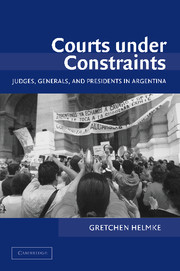Book contents
- Frontmatter
- Contents
- List of Tables
- List of Figures
- Preface and Acknowledgments
- 1 RULING AGAINST THE RULERS
- 2 THE LOGIC OF STRATEGIC DEFECTION
- 3 A THEORY OF COURT-EXECUTIVE RELATIONS: INSECURE TENURE, INCOMPLETE INFORMATION, AND STRATEGIC BEHAVIOR
- 4 JUDGES, GENERALS, AND PRESIDENTS: INSTITUTIONAL INSECURITY ON THE ARGENTINE SUPREME COURT, 1976–1999
- 5 THE REVERSE LEGAL-POLITICAL CYCLE: AN ANALYSIS OF DECISION MAKING ON THE ARGENTINE SUPREME COURT
- 6 THE DYNAMICS OF DEFECTION: HUMAN RIGHTS, CIVIL LIBERTIES, AND PRESIDENTIAL POWER
- 7 CONCLUSION: BROADER LESSONS AND FUTURE DIRECTIONS
- Appendix A Overview of the Federal Argentine Judiciary and the Argentine Supreme Court
- Appendix B The Argentine Supreme Court Decisions Data Set
- Appendix C Equilibria Proofs
- References
- Index
Preface and Acknowledgments
Published online by Cambridge University Press: 24 July 2009
- Frontmatter
- Contents
- List of Tables
- List of Figures
- Preface and Acknowledgments
- 1 RULING AGAINST THE RULERS
- 2 THE LOGIC OF STRATEGIC DEFECTION
- 3 A THEORY OF COURT-EXECUTIVE RELATIONS: INSECURE TENURE, INCOMPLETE INFORMATION, AND STRATEGIC BEHAVIOR
- 4 JUDGES, GENERALS, AND PRESIDENTS: INSTITUTIONAL INSECURITY ON THE ARGENTINE SUPREME COURT, 1976–1999
- 5 THE REVERSE LEGAL-POLITICAL CYCLE: AN ANALYSIS OF DECISION MAKING ON THE ARGENTINE SUPREME COURT
- 6 THE DYNAMICS OF DEFECTION: HUMAN RIGHTS, CIVIL LIBERTIES, AND PRESIDENTIAL POWER
- 7 CONCLUSION: BROADER LESSONS AND FUTURE DIRECTIONS
- Appendix A Overview of the Federal Argentine Judiciary and the Argentine Supreme Court
- Appendix B The Argentine Supreme Court Decisions Data Set
- Appendix C Equilibria Proofs
- References
- Index
Summary
As concern with the rule of law in Latin America and elsewhere continues to grow, this study provides a new framework for understanding how courts under constraints operate. The assumption that only independent judges rule against the rulers has long been the accepted wisdom among social scientists, policy makers, and citizens alike. Although this study initially shared the same premise, it arrives at a markedly different set of conclusions. Set in the turbulent institutional context of contemporary Argentina, the book demonstrates that sometimes the very lack of independence provokes judges to act as a check on their government, including the very government by whom the judges were earlier appointed. I refer to this important, if heretofore unexamined, phenomenon as strategic defection. In elaborating the specific mechanisms through which this dynamic occurs, the book challenges a range of classic and contemporary understandings about judicial behavior under conditions of institutional instability and uncertainty. In addition to solving several theoretical puzzles about court-executive relations in such environments, the study explores the substantive consequences of this reverse political-legal cycle for elites and citizens in Argentina and beyond.
At every stage of writing this book, I have benefited immeasurably from the advice, guidance, and support of others. As a doctoral student at the University of Chicago, I was extremely fortunate to begin this project under the guidance of my thesis advisers, Susan Stokes, Gerald Rosenberg, Cass Sunstein, and David Laitin. Susan Stokes was a constant source of support and inspiration.
Information
- Type
- Chapter
- Information
- Courts under ConstraintsJudges, Generals, and Presidents in Argentina, pp. xiii - xxPublisher: Cambridge University PressPrint publication year: 2004
